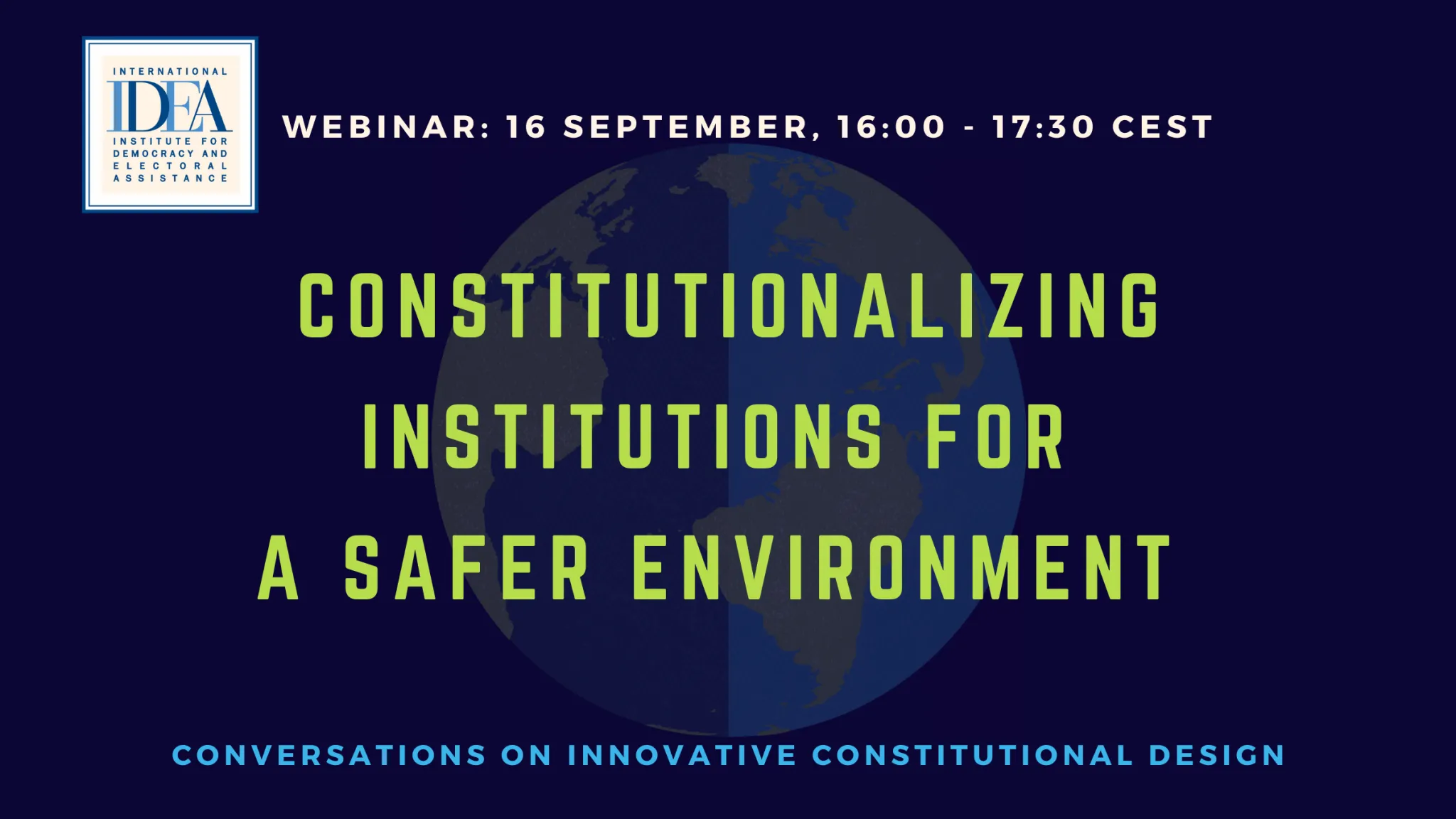Constitutionalizing Institutions for a Safer Environment: Examples from Kenya, Brazil and Hungary

As part of a series entitled Conversations on Innovative Constitutional Design Options, International IDEA’s Constitution Building Programme hosted an expert panel to discuss “Constitutionalizing Institutions for a Safer Environment” on 16 September 2021. The webinar deliberated on the role of constitutions in responding to the climate crisis, the most profound challenge to humanity, particularly zooming in on innovative institutions established in Brazil, Hungary and Kenya.
Este artículo está disponible en español.
International IDEA Secretary-General , Dr Kevin Casas-Zamora, delivered opening remarks emphasizing the importance of democracy and criticality of institutional innovation in tackling climate change, a new International IDEA cross-cutting priority. Casas-Zamora highlighted the unique role of constitutions in the fight against climate change, notably in creating and embedding robust institutional structures transcending political cycles and safeguarding the interests of future generations.
Dr David R. Boyd, the United Nations Special Rapporteur on Human Rights and the Environment, discussed the current landscape on constitutions and the environment. Boyd noted that over 100 constitutions contain in some iteration the right to a healthy environment, which provides the impetus for legislative reform, improved environmental performance, and increased jurisprudence on environmental issues.
Pioneering institutional frameworks for environmental rights
The introductory remarks provided the basis for a lively conversation on innovative constitutional institutions in Kenya, Brazil, and Hungary to promote, protect, monitor, and vindicate environmental rights. The discussion highlighted how the distinct nature and mandate of constitutionalized institutions allows intervention on environmental issues at different points of decision making. While the Environment and Land Court in Kenya and Ministério Público prosecutors in Brazil are generally reactive and seek to redress alleged environmental harms and discourage repeat offences, the Hungarian Ombudsman for Future Generations can invoke the precautionary principle to preemptively object to proposed legislation or other acts endangering basic living conditions of future generations.
The panelists emphasized the transdisciplinary nature of the issues surrounding climate change and sustainable development. Judges, prosecutors, and ombudsmen need expertise, training, and access to scientific knowledge to optimally discharge their duties. The far-reaching consequences of climate change further need creative, flexible, and holistic strategies. For example, in addition to their usual role as civil and criminal prosecutors, the Ministério Público has a range of extra-judicial powers that allow it, for instance, to negotiate agreements with polluters to prevent or reduce harm to the environment, allowing the efficient enforcement of rights and the resolution of conflict without overburdening the legal system. The office can further hold public hearings with experts and representatives of state institutions and civil society organizations, thus increasing popular participation, inclusivity, and legitimacy.
The Hungarian Ombudsman for Future Generations, through the Commissioner for Fundamental Rights, can approach the Constitutional Court to seek annulment of legislation endangering future generations (which recently resulted in the invalidation of key aspects of Hungary’s forest management legislation).
Overall, the experiences from the three countries reveal that constitutional establishment enhances the status, and functional, political, and financial independence of institutions charged with safeguarding the environment. The Ministério Público is constitutionally guaranteed independence, enabling it to call on other branches of government to fulfil their constitutional obligations to safeguard the environment. Its financial independence allows the office to invest in capacity enhancement and develop novel strategies to enforce existing laws.
In Kenya, increasing numbers of judges in the Environment and Land Court, and its increasing geographical reach, have enabled the Court to refine its jurisdiction and develop a robust jurisprudence, especially concerning the principle of sustainable development and the constitutional imperative of carrying out environmental impact assessments.
The Hungarian Ombudsman for Future Generations acts as a mediator between society and political organs, and builds a bridge between scientific hypotheses and politicians' short-term cost benefit analyses. Constitutionalisation also elevates the public and political profile of the institutions, in turn enhancing their ability to advance environmental protection and by extension ameliorate the climate crisis.
The case studies offer important lessons for constitutional designers and advocates of environmental justice. The recording of the conversation — available on YouTube — captures these insights and anecdotes, which will provide inputs for a knowledge resource that the Constitution Building Programme will develop in due course.
Kimana Zulueta-Fuelscher, Acting Head, Constitution Building Programme, hosted the event, while Adem K. Abebe, Programme Officer, Constitution Building Programme, served as moderator.
Case study experts:
- Kenya: Professor Patricia Kameri-Mbote, incoming Director of the Law Division at United Nations Environment Programme, Professor of Law at the Faculty of Law of the University of Nairobi; Founding Director of the International Environmental Law Research Centre (IELRC)
- Brazil: Ms Maria Antonia Tigre, Director of Latin America for the Global Network for the Study of Human Rights and the Environment
- Hungary: Professor Marcel Szabó, Judge of the Constitutional Court of Hungary; former Ombudsman for Future Generations of Hungary
Screenshot from Constitutionalizing Institutions for a Safer Environment webinar. Image credit: International IDEA




